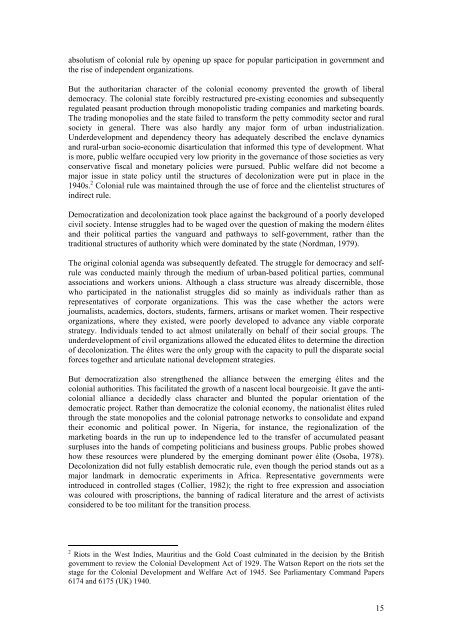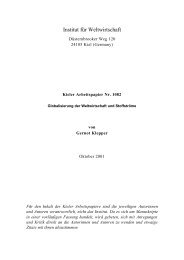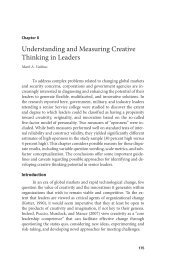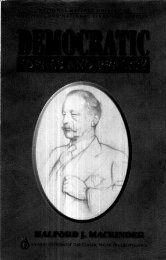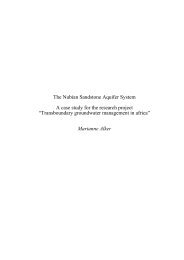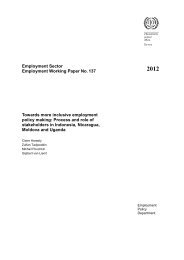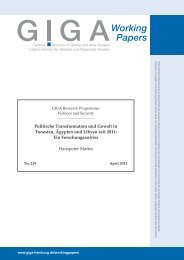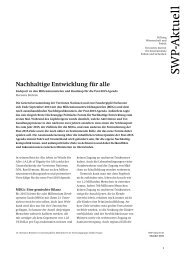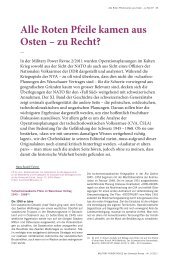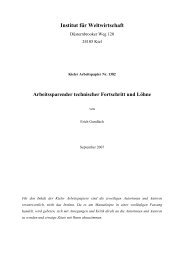Authoritarian Rule and Democracy in Africa: A Theoretical Discourse
Authoritarian Rule and Democracy in Africa: A Theoretical Discourse
Authoritarian Rule and Democracy in Africa: A Theoretical Discourse
You also want an ePaper? Increase the reach of your titles
YUMPU automatically turns print PDFs into web optimized ePapers that Google loves.
absolutism of colonial rule by open<strong>in</strong>g up space for popular participation <strong>in</strong> government <strong>and</strong>the rise of <strong>in</strong>dependent organizations.But the authoritarian character of the colonial economy prevented the growth of liberaldemocracy. The colonial state forcibly restructured pre-exist<strong>in</strong>g economies <strong>and</strong> subsequentlyregulated peasant production through monopolistic trad<strong>in</strong>g companies <strong>and</strong> market<strong>in</strong>g boards.The trad<strong>in</strong>g monopolies <strong>and</strong> the state failed to transform the petty commodity sector <strong>and</strong> ruralsociety <strong>in</strong> general. There was also hardly any major form of urban <strong>in</strong>dustrialization.Underdevelopment <strong>and</strong> dependency theory has adequately described the enclave dynamics<strong>and</strong> rural-urban socio-economic disarticulation that <strong>in</strong>formed this type of development. Whatis more, public welfare occupied very low priority <strong>in</strong> the governance of those societies as veryconservative fiscal <strong>and</strong> monetary policies were pursued. Public welfare did not become amajor issue <strong>in</strong> state policy until the structures of decolonization were put <strong>in</strong> place <strong>in</strong> the1940s. 2 Colonial rule was ma<strong>in</strong>ta<strong>in</strong>ed through the use of force <strong>and</strong> the clientelist structures of<strong>in</strong>direct rule.Democratization <strong>and</strong> decolonization took place aga<strong>in</strong>st the background of a poorly developedcivil society. Intense struggles had to be waged over the question of mak<strong>in</strong>g the modern élites<strong>and</strong> their political parties the vanguard <strong>and</strong> pathways to self-government, rather than thetraditional structures of authority which were dom<strong>in</strong>ated by the state (Nordman, 1979).The orig<strong>in</strong>al colonial agenda was subsequently defeated. The struggle for democracy <strong>and</strong> selfrulewas conducted ma<strong>in</strong>ly through the medium of urban-based political parties, communalassociations <strong>and</strong> workers unions. Although a class structure was already discernible, thosewho participated <strong>in</strong> the nationalist struggles did so ma<strong>in</strong>ly as <strong>in</strong>dividuals rather than asrepresentatives of corporate organizations. This was the case whether the actors werejournalists, academics, doctors, students, farmers, artisans or market women. Their respectiveorganizations, where they existed, were poorly developed to advance any viable corporatestrategy. Individuals tended to act almost unilaterally on behalf of their social groups. Theunderdevelopment of civil organizations allowed the educated élites to determ<strong>in</strong>e the directionof decolonization. The élites were the only group with the capacity to pull the disparate socialforces together <strong>and</strong> articulate national development strategies.But democratization also strengthened the alliance between the emerg<strong>in</strong>g élites <strong>and</strong> thecolonial authorities. This facilitated the growth of a nascent local bourgeoisie. It gave the anticolonialalliance a decidedly class character <strong>and</strong> blunted the popular orientation of thedemocratic project. Rather than democratize the colonial economy, the nationalist élites ruledthrough the state monopolies <strong>and</strong> the colonial patronage networks to consolidate <strong>and</strong> exp<strong>and</strong>their economic <strong>and</strong> political power. In Nigeria, for <strong>in</strong>stance, the regionalization of themarket<strong>in</strong>g boards <strong>in</strong> the run up to <strong>in</strong>dependence led to the transfer of accumulated peasantsurpluses <strong>in</strong>to the h<strong>and</strong>s of compet<strong>in</strong>g politicians <strong>and</strong> bus<strong>in</strong>ess groups. Public probes showedhow these resources were plundered by the emerg<strong>in</strong>g dom<strong>in</strong>ant power élite (Osoba, 1978).Decolonization did not fully establish democratic rule, even though the period st<strong>and</strong>s out as amajor l<strong>and</strong>mark <strong>in</strong> democratic experiments <strong>in</strong> <strong>Africa</strong>. Representative governments were<strong>in</strong>troduced <strong>in</strong> controlled stages (Collier, 1982); the right to free expression <strong>and</strong> associationwas coloured with proscriptions, the bann<strong>in</strong>g of radical literature <strong>and</strong> the arrest of activistsconsidered to be too militant for the transition process.2 Riots <strong>in</strong> the West Indies, Mauritius <strong>and</strong> the Gold Coast culm<strong>in</strong>ated <strong>in</strong> the decision by the Britishgovernment to review the Colonial Development Act of 1929. The Watson Report on the riots set thestage for the Colonial Development <strong>and</strong> Welfare Act of 1945. See Parliamentary Comm<strong>and</strong> Papers6174 <strong>and</strong> 6175 (UK) 1940.15


